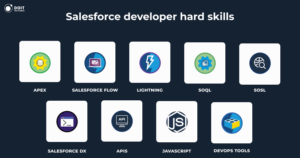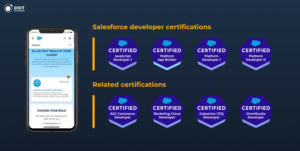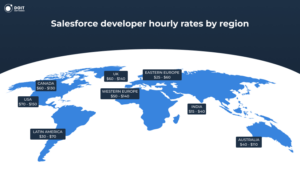A Salesforce developer is a software expert who extends and customizes Salesforce, a leading CRM platform with a 24% market share, to meet business needs. They work across data, sales, service, marketing, analytics, and commerce features, supporting over 150,000 companies that rely on the platform. However, searching for experts to tool these capabilities demands time and resources.
To hire Salesforce developers, you need to know where to find candidates, how to screen CVs and skills, what salary to offer, and so on. In this article, we’ll review all these steps to help you hire a Salesforce expert that matches your needs. So, let’s get started!
When you decide to hire Salesforce developers, the first thing is to match project requirements with candidates’ skills to create a job description. In this section, you’ll find out what Salesforce developer can do and their top skills for successful Salesforce implementation.
Most developers in this field build and adapt apps based on the Salesforce platform, using Apex programming language and Lightning Web Components. They can integrate CRM products and a range of Salesforce cloud solutions.
Salesforce developers’ key responsibilities include:
In addition to working within the Salesforce Platform, developers often use Heroku, a Platform as a Service (PaaS), to build standalone applications that connect to Salesforce. It supports many pro-code features with Node.js, Ruby, Java, PHP, Python, Go, Scala, Clojure, and .NET.
Although Heroku is still in use, its popularity in Salesforce apps has declined due to the discontinuation of its free tier. Now, developers more often use AWS Lambda, Azure Functions, and other modern serverless solutions.
After selecting an area of expertise, you should scan developers’ CVs for Salesforce skill sets. According to a recent Salesforce developer survey:
To ensure your candidate has the necessary knowledge, look for coders with experience in:

All in all, Salesforce developers more often use a combination of no/low-code and pro-code tools. Thus, you can now search for professionals with knowledge of not only Salesforce’s Apex and LWC but also full-stack capabilities with Node.js, Python, .NET, Ruby, Angular, etc.
But keep in mind that not every Salesforce developer role is expected to perform complex coding tasks. For example, a Salesforce OmniStudio developer can have basic skills with the concepts of interactive web apps but not always have experience with Apex or LWC, and that’s perfectly acceptable for such roles.
If you’re looking for a deeper breakdown of what skills matter in each case, check out our article Essential Salesforce Developer Skills: A Complete Guide for 2025.
According to the Salesforce developer survey, 84% of Salesforce experts hold at least one certification. Although optional, it’s always a good sign if a candidate has one.

Consider looking for Salesforce developers with such credentials:
In addition to the ones listed above, Salesforce developers often hold non-core certifications, such as Slack, Tableau, Scrum, AWS, and Project Management.
Also, a Salesforce developer’s resume is a great source for initial soft skills assessment. For example, you can check how candidates describe their past projects, achievements, and roles. Contributions to Salesforce communities and conferences may state good teamwork and learning skills. Mentoring mentions are essential if you want to hire a Salesforce developer as a Team or Tech Leader.
Thus, you can assess whether the programmer is eager to learn, has leadership skills, etc. And remember, to hire Salesforce developers, ensure their language skills and time zone match your team’s needs.
After setting the required skill set, the next step is to estimate the Salesforce developer hiring budget. There are usually two options here: in-house and contractor. Let’s have a further look.
With in-house recruiting, you hire Salesforce developers as full-time employees. This way, they will be 100% aligned with your company’s policies and culture and work with your existing team for a long time. The cost of such hiring depends on the annual salary.
Here are average values based on your region and Salesforce developer’s experience level as of early 2025:
US
$109,749
$127,030
$142,150
UK
$58,485
$73,106
$91,380
Norway
$62,478
$72,569
$97,818
Australia
$80,988
$115,000
$129,939
Switzerland
$98,877
$111,712
$122,299
Germany
$61,951
$77,733
$115,510
Canada
$100,625
$110,765
$142,149
Eastern Europe
$26,000
$37,564
$46,223
Latin America
$27,769
$42,206
$50,758
Source: The average Salesforce developer salary per year by country/region based on Glassdoor, Indeed, and the Trailhead career paths.
Add taxes, equipment, workplace, bonuses, perks, and other administrative costs to the budget. Also, ensure you have the right technical recruiter and team member with Salesforce expertise. They are essential for the proper and fast selection.
Otherwise, you can use the services of IT recruiting companies. These agencies already have a database of qualified Salesforce developers, so they can provide first-time CVs within one week. However, remember that IT recruiting companies charge up to 25% of the hire’s annual salary.
The next option is to hire Salesforce developers on freelance platforms. In the first case, you set up a short project and look for a specialist only for this task. A freelance Salesforce developer will charge you per hour or project. For example, on Upwork, the average hourly rate for a Salesforce programmer ranges from $25 to $100.
Freelance platforms provide access to a global talent pool, increasing the chances of the right fit. But if you hire a Salesforce freelancer, you may face a few challenges. For example, low levels of commitment, time zone differences, and the need for clear communication channels.

And the final option we recommend is the IT staff augmentation. You can hire Salesforce developers with a staffing company at 0% recruiting cost. The service provider will screen and interview candidates, provide a selection, and onboard them for you. Plus, staffing companies often handle all administrative issues, workplace, equipment, taxes, etc.
This way, you can hire Salesforce developers who meet your project’s needs without the hassle. They’ll work as dedicated employees; you can scale up or out of team sizes as needed. You can also ask for a developer replacement with knowledge transfer.
In this model, you pay only the hourly or monthly rates of the experts. Here are the average values based on the region:
$120/hour
$95/hour
$60/hour
$50/hour
Now, let’s figure out where to look for the best coders. The Salesforce community is large and has many specialized forums and job boards. Besides, you can consider freelance platforms, events, and social networks. Here is the complete list of where to hire Salesforce developers:
Job boards
Salesforce communities
Social media
Hackathons and conferences
Professional Salesforce services
Salesforce development companies
IT staffing agencies
IT recruitment agencies
Hiring Salesforce developers is a complex process, and it’s easy to make mistakes, especially if you’re new to the platform. Over the years, Salesforce has undergone significant transformations, and without the right knowledge, companies can fall into common traps. Below, we’ll explore the most frequent mistakes businesses make and how to avoid them.
In a recent survey, Salesforce developers reported feeling least confident in their LWC and front-end development skills. Why? The platform moved from Salesforce Classic to Lightning, from Visualforce to Aura, and then to LWC. These changes mean many developers might still rely on legacy knowledge that doesn’t align with modern Salesforce practices.
Even worse, publicly available resources, including interview questions, often focus on outdated workflows. This problem can lead companies to set the wrong expectations, especially when hiring their first Salesforce developer.
Salesforce is an entire ecosystem of roles. Here, you can find developers, admins, architects, marketers, and designers who all have different specialties. And the bigger issue here is that companies sometimes confuse roles entirely. It can lead to misaligned expectations and poor outcomes.
Another common challenge is the trend of hiring “adminelopers”, professionals expected to handle both Salesforce administration and development. While they may excel in administrative tasks, they often lack coding expertise and knowledge of development best practices.
Salesforce is becoming more complex every year. In fact, 1 in 2 developers say working with the platform is challenging. This is because modern Salesforce development requires balancing low-code with pro-code tools.
If you don’t gather the right requirements up front, you risk hiring someone who’s great at coding but struggles with declarative tools or vice versa. On top of that, legacy workflows and technical debt can make it even harder for a new hire to get things right.
Sometimes, the biggest hiring mistake is about the team developers joining. Recent surveys show that resource constraints and knowledge gaps are among the top challenges holding back Salesforce teams in 2025. If your team doesn’t have the right training to support new development, even the best developer will struggle.
So, what to do to avoid these hiring mistakes?
We hope this guide will help you find and hire Salesforce developers for your needs. Remember to be clear about the skill set you want, as well as the requirements, certifications, and experience level. Once you have these points, check the relevant resources and select the best fit.
If you don’t want to burden yourself with searching for candidates, you can also hire Salesforce developers with DOIT Software. Reach out to our team and get your first CVs in a few days.
Get a consultation and start building your dream team ASAP.
REQUEST CVSThe Salesforce Talent Ecosystem Report indicates that market interest in platform talent dropped by about 46% in 2023. However, Salesforce developers are still in demand, and here is why.
Forecasts say the Salesforce partner ecosystem will generate 9.3 million new jobs by 2026. Salesforce continues to occupy an increasing share of the CRM market. It is the 3rd largest revenue generator among cloud vendors after Microsoft and Amazon. Also, releasing new AI products will boost the demand for Salesforce developers in this area.
Because it gives you access to specialized expertise in the powerful Salesforce features. You can get everything from automation to analytics to ensure your CRM strategy aligns with your business goals. The Salesforce skill set improves system performance, fosters user adoption, and maximizes ROI.
The answer depends on the engagement model you choose. For example, in-house recruitment can take from weeks to several months. Or you can hire Salesforce developers in 2 to 4 weeks with a recruiting or staffing agency.










